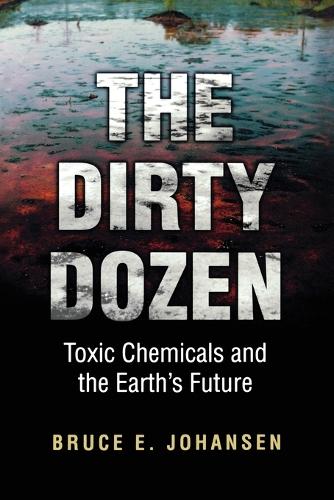
The Dirty Dozen: Toxic Chemicals and the Earth's Future
(Paperback)
Available Formats
Publishing Details
The Dirty Dozen: Toxic Chemicals and the Earth's Future
By (Author) Bruce E. Johansen
Bloomsbury Publishing PLC
Praeger Publishers Inc
30th June 2003
United States
Classifications
Professional and Scholarly
Non Fiction
Environmental factors
363.7384
Physical Properties
Paperback
312
Width 156mm, Height 235mm
454g
Description
Forty years after the publication of Rachel Carson's Silent Spring, this important study examines the history, industrial uses, and harmful effects of the twelve most commonly used organochloride chemicals. All have been fully or partially banned by the Stockholm Protocol, an international treaty signed by about 120 countries in December 2000. Among the twelve are the dioxins (the active ingredient in Agent Orange) and polychlorinated byphenyls (PCBs), which are toxic in minute quantities. Johansen pays special attention to the Inuit of the Arctic, where these chemicals have been bio-accumulating to dangerous levels, moving up the food chain to a degree of toxicity that some Inuit mothers are no longer able to safely breast-feed their infants. The polar stratospheric ozone has been devastated by emissions of chlorofluorocarbons (CFCs), and new scientific findings connect global warming near the Earth's surface to significant cooling in the stratosphere. This synergy aggravates ozone depletion because the chemical reactions that destroy the ozone become more energetic as temperatures drop. Synthetic toxins have taken their toll on minority ethnic groups in the United States, and persistent organic pollutants have inflicted physiological damage on humans and other animals. Finally, Johansen explores the estrogenic effects of such chemicals. Sperm counts have declined as much as 50% in 50 years.
Reviews
Many environmentalists will heartily agree with the author's conclusions.Recommended. General readers; lower-division undergraduates. * Choice *
If you thought Rachel Carson's Silent Spring was scary, this alarming expose will knock your socks off. Recommended for most environmental collections. * Library Journal, Starred Review *
Johansen examines the history, industrial uses, and harmful effects of the 12 most commonly used organochloride chemicals. All have been fully or partially banned by the Stockholm Protocol. * Abstracts of Public Administration, Development, and Environment *
[T]his book can serve as a useful source of bibliographical information and summery materials. * Natural Resources Forum *
[T]his volume is worth a thoughtful reading and should be in the science collections of all public, college and university libraries. * Robert B. Ridinger, Chair, Electronic Information Resources Management, Northern *
[A] valuable guide to librarians wishing to build their collections on this admittedly complicated subject. This volume is worth a thoughful reading and should be in the science collections of all public, college univesity libraries. * E-Streams *
[F]rom dioxins to the accumulation of dangerous chemicals in arctic environments, The Dirty Dozen reveals patterns of migration, synergy and chemical reactions which have an ongoing effect on the Earth's systems. * Internet Bookwatch *
Author Bio
BRUCE E. JOHANSEN is Robert T. Reilly Professor of Communication and Native American Studies at the University of Nebraska, Omaha. His last book was The Ecocide of Native America (1995).
